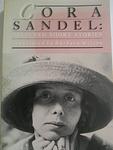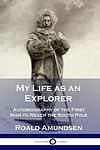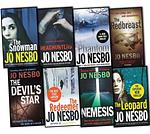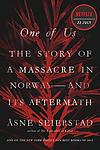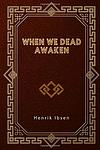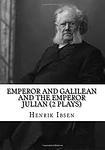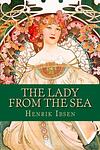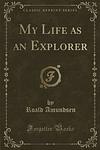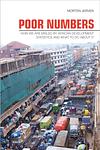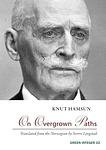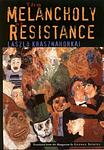The Greatest Norwegian Books of All Time
Click to learn how this list is calculated.
This list represents a comprehensive and trusted collection of the greatest books. Developed through a specialized algorithm, it brings together 300 'best of' book lists to form a definitive guide to the world's most acclaimed books. For those interested in how these books are chosen, additional details can be found on the rankings page.
Genres
Countries
Date Range
Reading Statistics
Click the button below to see how many of these books you've read!
Download
If you're interested in downloading this list as a CSV file for use in a spreadsheet application, you can easily do so by clicking the button below. Please note that to ensure a manageable file size and faster download, the CSV will include details for only the first 500 books.
Download-
26. The Master Builder by Henrik Ibsen
"The Master Builder" is a play focused on the life of Halvard Solness, a successful yet self-absorbed architect who is haunted by past mistakes and fears the rise of a younger generation. His life takes a turn when a young woman, Hilda, arrives, reminding him of a promise he made to her a decade ago. As Solness grapples with his past, present, and future, the play explores themes of ambition, power, guilt, and the cost of success.
-
27. Selected Short Stories Of Cora Sandel by Cora Sandel
The collection of short stories by the Norwegian author offers a rich tapestry of human experience, capturing the subtle nuances of everyday life with a keen eye for detail and a deep understanding of the human condition. Set against the backdrop of early 20th-century Scandinavia, the stories delve into themes of love, loss, identity, and the struggle for self-expression. The author's lyrical prose and empathetic character portrayals invite readers into intimate worlds where ordinary moments reveal profound truths, and the quiet struggles of her characters resonate with universal significance.
-
28. The South Pole by Roald Amundsen
The book is a detailed firsthand account of the first successful expedition to the South Pole, led by the author, a noted Norwegian explorer. It chronicles the meticulous planning, the journey's challenges, and the strategic decisions that enabled the team to reach the pole on December 14, 1911, ahead of their British rivals. The narrative combines personal reflections, vivid descriptions of the harsh Antarctic environment, and insights into the teamwork and innovation crucial for survival and success in one of the most extreme climates on Earth.
-
29. An Enemy of the People by Henrik Ibsen
An Enemy of the People is a drama about a doctor in a small Norwegian town who discovers that the local baths, a source of pride and income for the community, are contaminated and dangerous to public health. Despite the potential harm to the town's residents, the doctor's warnings are ignored by the town's authorities and citizens due to the potential economic fallout. The doctor is ostracized and declared an 'enemy of the people,' leading to a critique of the democratic process and the responsibilities of individuals to their community.
-
30. The Redbreast by Jo Nesbø
"The Redbreast" is a gripping thriller that follows the life of Detective Harry Hole as he investigates a series of mysterious murders that seem to be connected to events from World War II. As he delves deeper into the case, Hole uncovers a web of conspiracy, betrayal, and political intrigue that spans decades and threatens to shake the foundations of his own life. With its complex characters, intricate plot, and atmospheric setting, "The Redbreast" keeps readers on the edge of their seats until the final page.
-
31. One Of Us: The Story Of Anders Breivik And The Massacre In Norway by Asne Seierstad
One of Us by Asne Seierstad is a detailed account of the 2011 terrorist attack in Oslo, Norway, carried out by Anders Breivik. The book explores Breivik's background, motives, and planning leading up to the attack, as well as the aftermath and impact on the survivors and families of the victims. Seierstad's thorough research and interviews with those affected provide a comprehensive and emotional portrayal of the tragedy, shedding light on the complexities of extremism and the devastating consequences of hate.
-
32. The Half Brother: A Novel by Lars Saabye Christensen
"The Half Brother" is a compelling narrative that follows the life of a young man named Barnum Nilsen. Born into a Norwegian family with a mysterious past, Barnum navigates through life with a half-brother, Fred, who is both his best friend and his rival. As Barnum grows older, he becomes a successful writer, but his personal life is marked by loss, loneliness, and the weight of his family's secrets. The book is a profound exploration of identity, love, and the bonds of family.
-
33. Ecology, Community And Lifestyle by Arne Naess
"Ecology, Community and Lifestyle" is a philosophical text that outlines the principles of deep ecology, a movement emphasizing the intrinsic value of all living beings and the need for radical shifts in modern human societies to sustain ecological balance. The book delves into the interdependence between human life and the environment, advocating for a comprehensive transformation in our lifestyles and political systems to foster a sustainable relationship with the earth. It combines insights from ecology, philosophy, and sociology to propose a more harmonious way of living that respects the limits of the planet's resources and promotes a thriving, diverse biosphere.
-
34. Brand by Henrik Ibsen
The play revolves around the story of a stern and idealistic priest who lives in the harsh, unforgiving climate of rural Norway. The protagonist is unwavering in his religious and moral convictions, refusing to compromise on his ideals even when faced with personal tragedy and the suffering of those around him. His rigid adherence to principle leads him to make decisions that have devastating effects on his own life and the lives of the community members. The narrative explores themes of sacrifice, the conflict between duty and compassion, and the quest for true Christian living in a flawed world. Ultimately, the protagonist's journey is a tragic reflection on the cost of absolute integrity.
-
35. The Wild Duck by Henrik Ibsen
"The Wild Duck" is a tragicomedy that explores themes of reality and illusion, as well as the destructive power of idealism. The story revolves around a man who returns home after 16 years to find his father married to his former lover. He believes he is doing the right thing by revealing the truth about their past, but his idealistic pursuit of the truth only leads to the destruction of the family's harmony. The wild duck in the story symbolizes the damage caused by harsh reality, suggesting that sometimes illusion is necessary for survival.
-
36. When We Dead Awaken by Henrik Ibsen
"When We Dead Awaken" is a dramatic play that revolves around the story of a renowned sculptor who encounters his muse from the past, leading to a profound reevaluation of his life and work. As he grapples with the realization that his artistic success has come at the expense of genuine human connection and passion, the play delves into themes of artistic integrity, lost love, and the quest for redemption. The narrative unfolds in a series of intense encounters and conversations, culminating in a climactic moment that forces the characters to confront the consequences of their choices and the transient nature of life and art.
-
37. Emperor And Galilean by Henrik Ibsen
"Emperor and Galilean" is a historical drama that centers on the life of the Roman Emperor Julian the Apostate, who reigned in the 4th century. The play explores Julian's internal conflict as he attempts to revive pagan worship in the face of the growing influence of Christianity. As Julian becomes increasingly disillusioned with Christian doctrine, he seeks to establish a new world order based on a synthesis of Greek philosophy and pagan gods. His quest for spiritual and political transformation leads him on a tragic journey, culminating in his ultimate failure and realization of the futility of his ambitions. The narrative delves into themes of power, faith, and the human struggle between the divine and earthly realms.
-
38. The Lady From The Sea by Henrik Ibsen
The play centers around Ellida Wangel, a lighthouse-keeper's daughter who is trapped in an unhappy marriage with Dr. Wangel. She is haunted by her past and her mysterious attachment to a seafaring stranger who once promised to return for her. As she grapples with her longing for the sea and her duty to her family, the play explores themes of freedom, choice, and the powerful pull of one's origins. When the stranger reappears, Ellida must confront her desires and decide whether to remain on land with her husband and stepdaughters or to yield to the call of the sea and the life she once knew.
-
39. My Life As an Explorer (Amundsen) by Roald Amundsen
This autobiography tells the story of a Norwegian explorer who led the first expeditions to reach the South Pole, traverse the Northwest Passage, and fly over the North Pole in a dirigible. The book provides a detailed account of his adventures, including his experiences with the indigenous peoples of the Arctic, his struggles with harsh weather conditions, and his insights on leadership and survival in extreme environments. The author's love for exploration and his respect for the natural world shine through in his writing.
-
40. A Death in the Family by Karl Ove Knausgaard
"A Death in the Family" is a deeply personal and introspective narrative that delves into the complexities of familial relationships, childhood, death, and memory. The protagonist, a writer, is forced to confront his past and his relationship with his alcoholic father after his death. The novel explores the impact of this death on the protagonist's life and his struggle to come to terms with his complicated feelings of love, resentment, and guilt. The narrative is a profound exploration of the human condition, the intricacies of family dynamics, and the lasting impact of grief and loss.
-
41. The Snowman by Jo Nesbo
This gripping thriller follows a determined detective as he investigates a series of chilling disappearances that occur on the first snowfall of each year. The only clue linking the cases is a snowman left at each scene, serving as a sinister signature from the perpetrator. As the detective delves deeper into the mystery, he uncovers a pattern of crime that leads him into a dark and complex web of secrets. The narrative builds with suspense, leading to a confrontation with a cunning and ruthless killer. Set against a bleak, wintry landscape, the story explores themes of obsession, loss, and the nature of evil, keeping readers on the edge of their seats until its shocking conclusion.
-
42. Poor Numbers by Morten Jerven
This book critically examines the reliability of economic statistics in Sub-Saharan Africa, revealing a significant gap between the reported data and the actual economic realities on the ground. The author delves into the systemic issues plaguing statistical offices across the continent, including underfunding, political interference, and a lack of technical capacity, which collectively contribute to the production of inaccurate economic data. By analyzing the processes and methodologies used to gather and report these statistics, the book sheds light on the profound implications these "poor numbers" have for policy-making, economic development, and international perceptions of African economies. Through this exploration, it calls for a reevaluation of how economic data in these countries is collected and used, advocating for reforms that could lead to more accurate and meaningful measurements of economic progress.
-
43. On Overgrown Paths by Knut Hamsun
This book is a poignant autobiographical work that delves into the author's experiences during the twilight years of his life, particularly focusing on the period of his arrest and trial for collaboration with the Nazis during World War II. Written with a reflective and introspective tone, it navigates through his thoughts, daily encounters, and the natural landscapes that surround him, offering a unique insight into his inner world and the complexities of his situation. Despite the controversies surrounding his political affiliations, the narrative is a deeply human exploration of solitude, resilience, and the enduring power of the human spirit to find beauty and meaning in the face of adversity.
-
44. Melancholy by Jon Fosse
This book delves into the life of Lars Hertervig, a young and impoverished painter from Norway in the 19th century, who grapples with the torment of unrequited love and the burgeoning realization of his own mental illness. Set against the backdrop of his studies at the Düsseldorf Academy of Art, the narrative explores Hertervig's descent into madness, interweaving his intense relationship with nature, his struggles with societal expectations, and his profound isolation. Through a lyrical and fragmented prose, the novel poignantly captures the essence of melancholy and the artist's tumultuous journey towards understanding his own mind and art.
Reading Statistics
Click the button below to see how many of these books you've read!
Download
If you're interested in downloading this list as a CSV file for use in a spreadsheet application, you can easily do so by clicking the button below. Please note that to ensure a manageable file size and faster download, the CSV will include details for only the first 500 books.
Download
